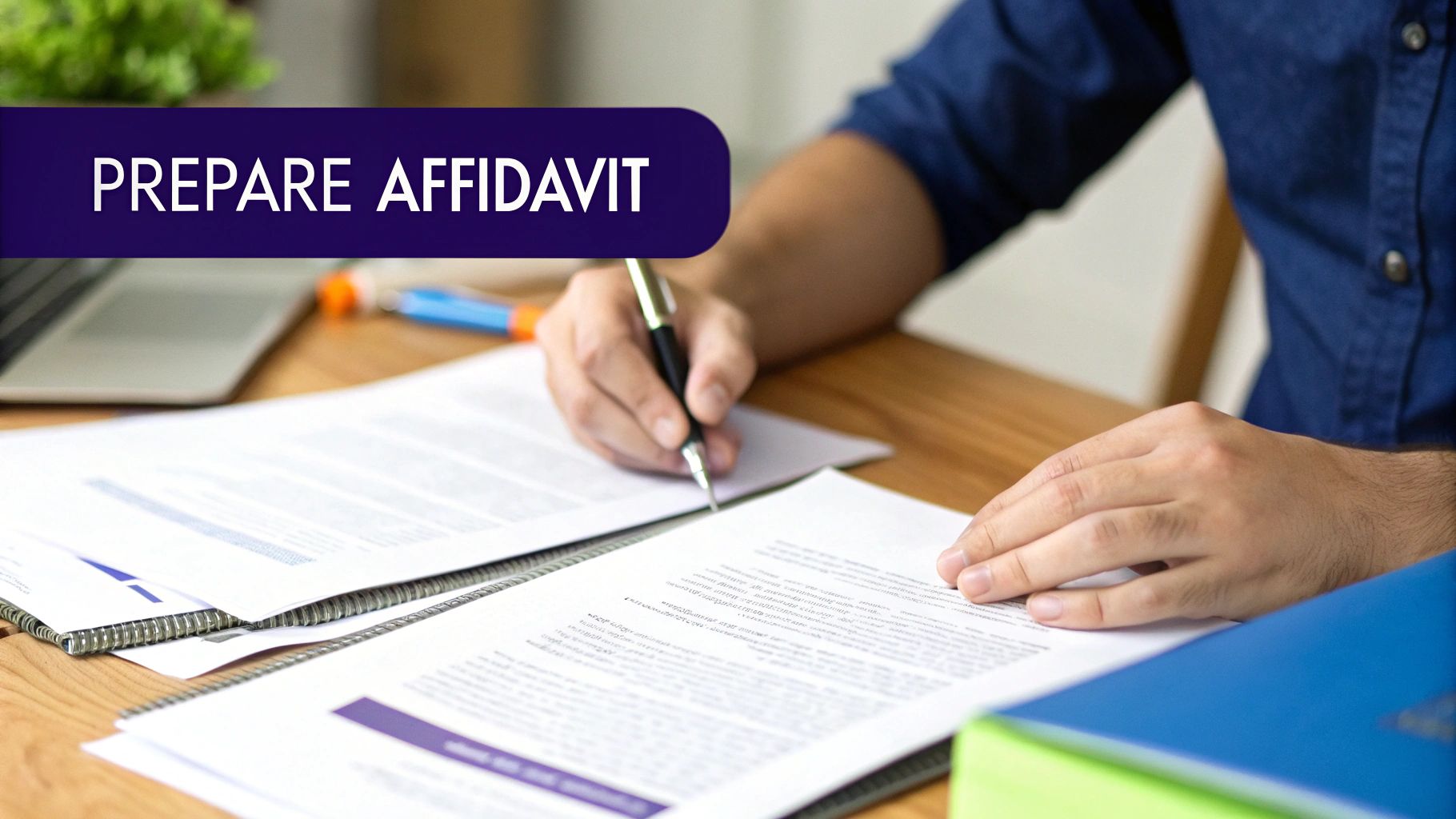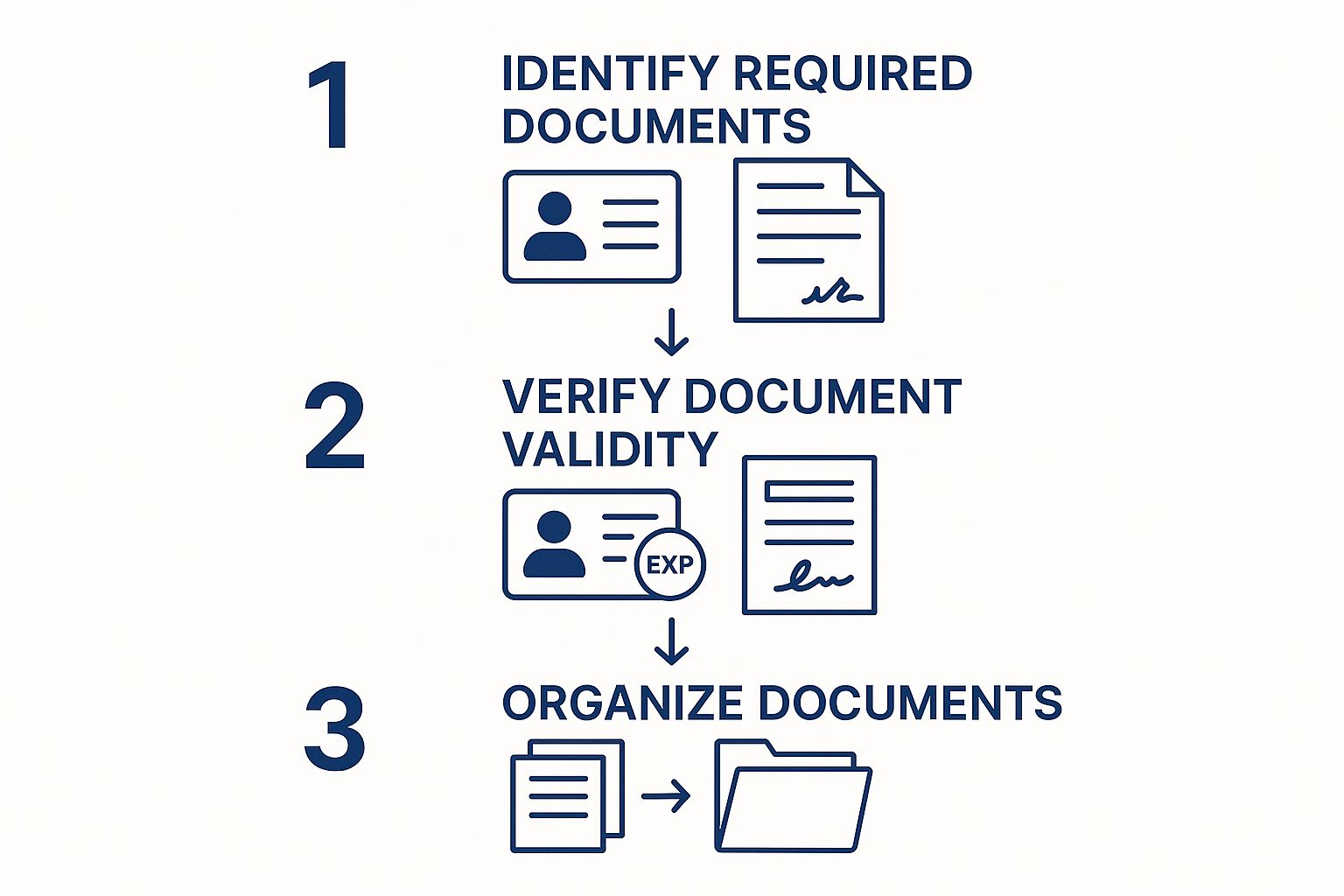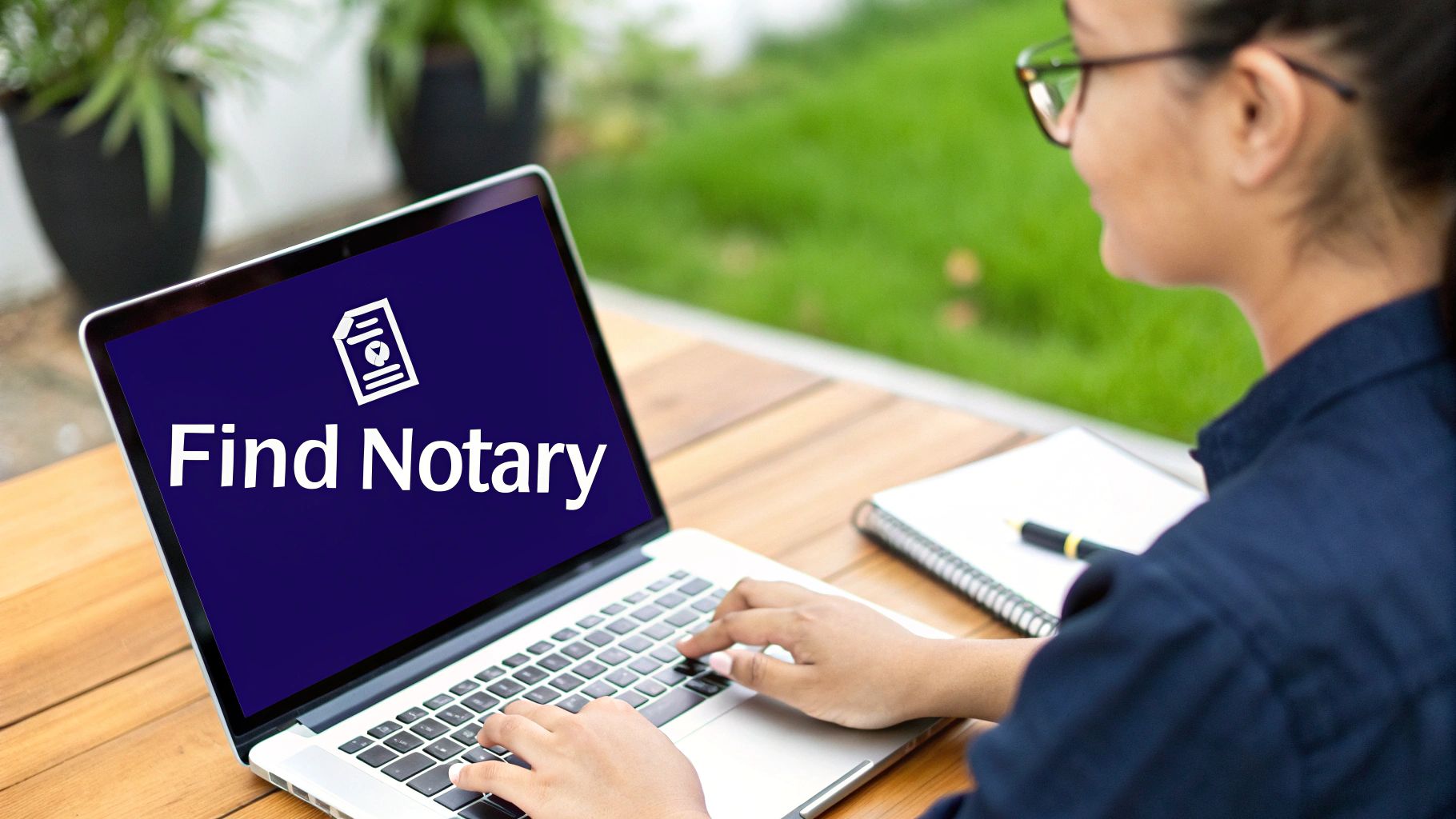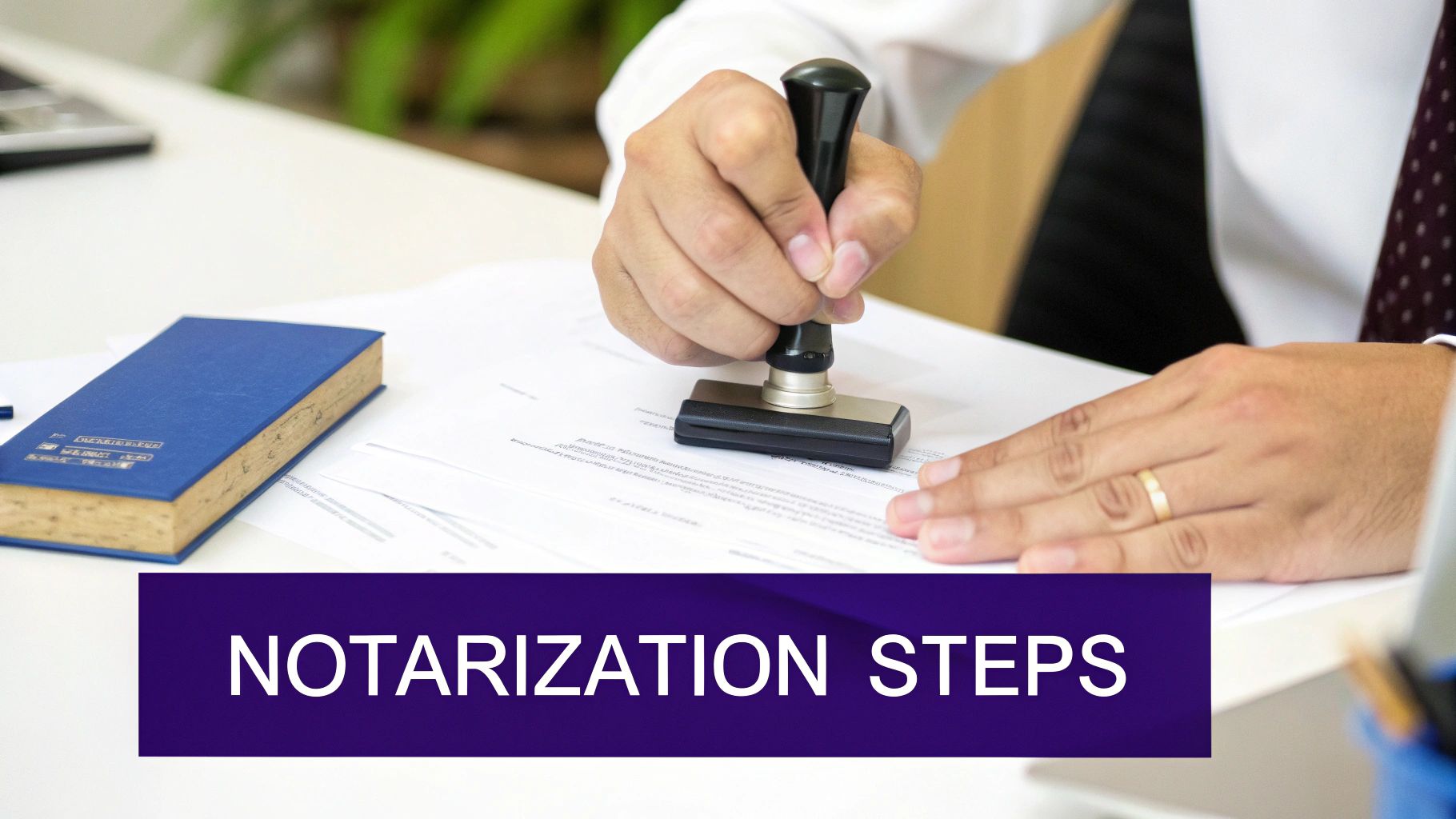How to Notarize an Affidavit Online Fast
- WebsiteFix Technical Partner
- Aug 3, 2025
- 15 min read
Getting an affidavit notarized used to be a real hassle. You’d have to find a local notary, rush over during your lunch break, and hope they were available. The core requirement hasn't changed—you still need to sign your document in front of a commissioned notary public who has verified your identity with a valid photo ID. What has changed is how you get it done.
Thankfully, those days of rearranging your schedule are mostly behind us. With virtual services, you can now get your sworn statements notarized from home, the office, or even while traveling, often in just a few minutes.
A Modern Guide to Affidavit Notarization
The whole process has been completely re-imagined for our busy lives. You're no longer tied to the 9-to-5 schedule of a bank or shipping store. Two fantastic, secure alternatives have emerged that fit the way we work today: online and mobile notary services.
This flexibility comes from two main options:
Remote Online Notarization (RON): This is the all-digital route. You connect with a certified notary using secure video conferencing software right from your computer or smartphone. The best part? It's often available 24/7.
Mobile Notary Services: If you prefer face-to-face interaction but can't be bothered with the travel, this is your answer. A mobile notary will come directly to you, wherever you are—your office, a coffee shop, even your kitchen table.
Why Modern Notarization Just Makes Sense
The biggest win here is convenience, hands down. A quick search for "how to notarize an affidavit" no longer leads to a logistical puzzle. Instead, it’s simply a matter of deciding which modern method—virtual or mobile—works best for you. No more traffic, no more waiting rooms. You get your documents handled on your time.
But it’s not just about being easy. Today's virtual notarization services are built for security and efficiency. The advanced identity verification used in RON platforms and the focused attention of a mobile notary both guarantee your documents are handled professionally and in full legal compliance.
These aren't just workarounds; they are robust, legally-binding alternatives to the old way. For example, every remote online notarization session is recorded and securely stored. This creates a tamper-proof digital record of the signing, adding a powerful layer of fraud protection that traditional methods can't match.
I wrote this guide to walk you through it all, step by step, so you can feel confident using these online and mobile services. From prepping your affidavit to the final seal, you’ll see just how simple it is to get it done right. If you want to better understand the legal weight behind this process, you can learn more by exploring our guide on the power of notarization.
The Two Paths to Effortless Notarization
Let's paint a picture. You have an affidavit for a court case, and the deadline is tomorrow. The old way would involve a frantic search for a notary, probably ending in frustration.
But today, you have choices. You could be sitting on your couch at 9 PM, log into a secure online platform, and have the document notarized by a remote notary in under 10 minutes.
Or, if you’re swamped at work, you could book a mobile notary to swing by your office during your lunch hour. Both paths get you the same legally valid result. The difference is the type of convenience you get. That flexibility is the real game-changer.
Getting Your Affidavit Ready for a Flawless Notarization

Before you even think about connecting with an online or mobile notary, your affidavit needs to be in perfect shape. I’ve seen it time and time again: a well-prepared document leads to a smooth, quick process. A flawed one? That’s where you hit frustrating delays or even an outright rejection from the notary. Think of this as your pre-flight checklist for a successful notarization.
The first thing to understand is the anatomy of your affidavit. While the specific facts are unique to your situation, every single affidavit has core components a notary is trained to look for. These elements are non-negotiable and confirm the document’s purpose and your intent.
The Key Parts of a Valid Affidavit
An affidavit isn’t just a simple signed statement; it's a structured legal document. Making sure it contains all the necessary parts is your first major step. It’s what separates a valid document from a piece of paper.
Here’s what your document absolutely must include:
A Title: This clearly identifies the document, like "Affidavit of John Smith."
The Venue: This states the location (state and county) where you are signing and getting the affidavit notarized.
The Affiant's Statement: This is the heart of the document—the sworn facts you are attesting to. It needs to be written clearly and concisely.
The Signature Line: A dedicated space for you, the affiant, to sign your name.
The Jurat: This is the notary's territory. It’s a specific clause stating when, where, and before whom the affidavit was sworn. You’ll see language like, "Subscribed and sworn to before me..."
To make sure your affidavit is consistent and free of common errors before notarization, you might want to look into legal document automation software. These tools can really help prevent simple drafting mistakes that could otherwise slow you down.
The Golden Rule: Do Not Sign in Advance
If you take only one piece of advice from this, let it be this: do not sign your affidavit before your notarization appointment. I can’t stress this enough. Your signature is only valid if the notary actually witnesses you signing it, whether that’s in person or over a live video feed for Remote Online Notarization (RON).
Signing beforehand is the most common—and completely avoidable—reason notarizations get rejected. The entire purpose of the jurat is for the notary to certify that you, the identified individual, personally signed the document in their presence after taking an oath. If the signature is already there, the notary legally cannot complete their duty.
A core principle of notarization is the personal appearance of the signer. The notary has to verify your identity and your willingness to sign the document under oath. This fundamental safeguard is what gives a notarized affidavit its legal power.
Gathering Your Required Documents
Once your affidavit is drafted and ready, it's time to get your personal documents in order for the appointment. The main requirement is a valid, government-issued photo ID. This is non-negotiable. The notary's primary function, after all, is to confirm you are who you say you are.
Acceptable forms of identification typically include:
A state-issued driver's license or ID card
A U.S. passport or passport card
A U.S. military ID card
Check your ID right now. Make sure it's current and not expired. An expired ID will be rejected on the spot, and you'll have to reschedule your appointment. It's a tiny detail that can cause a major headache if you overlook it.
Finally, if you need a hand with the initial drafting, we can help. Many online services offer document preparation assistance. Take a look at our guide on how to create an affidavit online with our quick and easy guide for more detailed support. It’s designed to help you format your document correctly from the very beginning, setting you up for a perfect notarization.
Choosing Your Notarization Method
With your affidavit drafted and your ID in hand, you've reached a key decision point. Gone are the days of hunting down a notary at a bank or shipping store. Today’s options are built for convenience, fitting notarization into your life, not the other way around.
You’re basically choosing between two modern, efficient paths: Remote Online Notarization (RON) and Mobile Notary services. Both are secure, legally sound, and will save you a ton of hassle. The right choice for you really boils down to what you prioritize: the lightning-fast speed of an all-digital process or the personalized convenience of a face-to-face meeting on your turf.
The All-Digital Path: Remote Online Notarization
Remote Online Notarization, or RON, is about as convenient as it gets. This method lets you get your affidavit notarized completely online, from anywhere in the world. The best part? It's often available 24/7. The whole process happens through a secure video call, where you connect with a commissioned notary in a virtual session.
From my experience, the process is surprisingly straightforward. Here’s a quick rundown of what to expect:
Access a Secure Platform: You’ll start on a secure portal, like the one we provide at Signature on Demand, using your computer or smartphone.
Upload Your Document: Just upload the digital version of your affidavit. It's as simple as attaching a file to an email.
Verify Your Identity: This is where the tech comes in. The system first walks you through taking pictures of your government-issued ID. Sophisticated software analyzes it to ensure it's authentic. You'll then answer a few security questions based on public records (things like old addresses or associated vehicles) to double-confirm your identity.
Meet Your Notary: Finally, you'll join a live, recorded video call with the notary. They will administer the oath, watch you electronically sign the document right on the screen, and then apply their own digital seal and signature. It’s all done in one seamless session.
RON is a game-changer for anyone needing immediate notarization, whether it's late at night or you're traveling abroad. If you want to get into the nitty-gritty of the technology and legalities, our complete guide on how to get documents notarized online covers everything in detail.
To make sure your session goes smoothly, a little preparation goes a long way. This infographic shows just how simple it is.

As you can see, a successful notarization really just starts with having your affidavit and ID ready to go.
The Personalized Service: A Mobile Notary
What if you prefer an in-person signing but can't stand the thought of running errands? That’s where a mobile notary comes in. Instead of you going to them, the notary travels directly to a location you pick—your office, your home, a hospital room, even a coffee shop.
The process feels traditional but with a modern layer of convenience. You simply schedule an appointment, and the notary meets you there. They will:
Travel to your specified location at the scheduled time.
Review your unsigned affidavit and check your valid photo ID.
Administer the oath and watch you physically sign the document with a pen.
Complete the notarial certificate with their official stamp and signature.
This service is perfect for situations that benefit from a human touch, like real estate closings where multiple parties are signing, or for assisting someone with limited mobility. You get the classic pen-and-ink experience without any of the logistical headaches.
Remote Online Notarization vs Mobile Notary Service
Still on the fence? I get it. Both options are great, but they serve different needs. This table breaks down the key differences to help you see which service aligns better with your situation.
Feature | Remote Online Notarization (RON) | Mobile Notary Service |
|---|---|---|
Location | Anywhere in the world with a stable internet connection. | A physical location of your choice within the notary's service area. |
Speed & Availability | Often 24/7 on-demand. Sessions usually take about 15 minutes. | Requires scheduling an appointment, subject to the notary's availability. |
Technology Needed | A computer or smartphone with a camera, mic, and internet. | None for the signer. The notary brings everything. |
Process | Digital document upload, virtual ID check, and e-signing. | In-person ID check and a traditional "wet-ink" signature. |
Best For | Urgent documents, tech-savvy individuals, or people located remotely. | Real estate closings, signers needing assistance, or anyone preferring in-person interaction. |
Ultimately, the best method is the one that removes friction from your day. If speed and digital access are your top priorities, RON is the clear winner. If you value a face-to-face meeting on your own terms, a mobile notary provides that perfect blend of personal service and convenience.
Navigating International Notarization Requirements

When an affidavit needs to hold up in another country, getting it notarized is often just the beginning. Sending legal documents across borders adds an extra layer of validation to prove they’re authentic, and this is where many people get tripped up. A simple notary stamp from your home state, unfortunately, usually isn't enough.
The whole process can feel intimidating, but it breaks down into two main paths: apostilles and consular legalization. Which one you'll need depends entirely on the country where your document is heading.
The Hague Apostille Convention Explained
The most straightforward way to get your affidavit recognized abroad is with an apostille. Think of an apostille as a special certificate attached to your document. It’s issued by a designated authority, like the Secretary of State, and essentially verifies that your notary's signature and seal are legit.
This simplified process exists thanks to the Hague Apostille Convention, an international treaty created to cut through the red tape of cross-border document verification.
If the destination country is part of this convention, you're in luck. The apostille is a one-and-done solution. Once it's affixed to your notarized affidavit, it’s considered legally valid in any other member country. No more hoops to jump through. For time-sensitive things like international business contracts or legal proceedings, this is a game-changer.
When an Apostille Is Not Enough
So, what happens if the country isn't a member of the Hague Convention? This is where things get more involved. You’ll have to go through a process called consular legalization (or consular authentication), which is a multi-step chain of verification.
It typically looks something like this:
First, your affidavit is notarized locally.
Then, the county clerk verifies the notary's commission.
Next, it goes to the Secretary of State for authentication.
After that, the U.S. Department of State needs to authenticate it.
Finally, the document is presented to the embassy or consulate of the destination country for their official stamp of approval.
As you can see, it's a far more complex and time-consuming journey. A single misstep at any point can send you right back to the start, costing you precious time and money. It's precisely this complexity that makes professional guidance so valuable.
International notarization is its own beast. Different countries have their own unique laws, and that’s where an expert makes all the difference. An international notary lives and breathes these legal standards, ensuring documents like affidavits, powers of attorney, or adoption papers meet the strict criteria for acceptance abroad. You can learn more about the complexities of cross-border document validation and see why this specialized knowledge is so critical.
A Real-World Scenario: Power of Attorney Abroad
Let's put this into practice. Imagine you own property in Spain but you're living in the United States. To sell it, you need to grant a Power of Attorney to your representative in Spain, a document that must be notarized.
The good news? Spain is a member of the Hague Convention, so your path is clear.
Here’s how Signature on Demand would handle this:
Document Prep: We’d help you draft the Power of Attorney affidavit, making sure it meets both U.S. and Spanish legal requirements right out of the gate.
Convenient Notarization: You could use our Remote Online Notarization (RON) service right from your living room or have a mobile notary meet you at the office. Whatever works for you.
Apostille Facilitation: Once notarized, we'd manage the entire apostille process. We’d submit the document to the Nevada Secretary of State and make sure it comes back with the correct certificate, ready to go.
Without this kind of end-to-end management, you might just get the document notarized, send it to Spain, and have it rejected for lacking an apostille. That one mistake could put the entire property sale on hold. By handling the whole workflow, we eliminate the guesswork and ensure your document is ready for international use.
What to Expect During Your Notarization Session

Whether you’re meeting a mobile notary at a coffee shop or logging into a secure video call from your home office, understanding the flow of the appointment can take away any sense of intimidation. Getting an affidavit notarized isn't just about a rubber stamp on a piece of paper. It’s a formal, legally defined process that gives your document its official weight.
The good news? It’s designed to be both thorough and incredibly efficient. Many of our clients are surprised to learn that a standard Remote Online Notarization (RON) session often takes just 15 minutes. Let's break down exactly what the notary does, so you know what’s happening at every turn.
The First Hurdle: Verifying Your Identity
A notary's most critical responsibility is to confirm you are exactly who you claim to be. Think of this as the foundation of the entire notarization—without it, the process stops dead in its tracks.
If you’re meeting a notary in person, they'll carefully examine your government-issued photo ID. They're trained to compare the photo to you, check the expiration date, and look for any signs it might be fake. With a virtual RON session, the technology is even more advanced. You’ll use your phone or webcam to snap a picture of your ID, which is then analyzed by sophisticated software. Next, you'll answer a few questions based on your public record and credit history, adding a powerful second layer of security.
This step is non-negotiable. It’s what protects everyone from fraud and legally binds the affidavit to you.
Administering the Oath or Affirmation
Once your identity is locked in, the notary will perform the verbal ceremony that is the heart of an affidavit: administering an oath or affirmation. This is the moment you formally declare that the statements in your document are the truth.
The notary will give you a choice:
An oath is a solemn promise that often references a higher power, like, "Do you swear under penalty of perjury that the statements in this document are true, so help you God?"
An affirmation is a non-religious equivalent, made on your personal honor. For example, "Do you solemnly affirm under penalty of perjury that the statements in this document are true?"
You must give a clear, verbal "I do" or "I affirm." A head nod won't cut it. This spoken declaration is a legally binding act and a required part of notarizing an affidavit.
Witnessing the Signature and Applying the Seal
With your sworn statement made, the notary will then watch you sign the affidavit. If you're with a mobile notary, you'll use a pen. In a virtual session, you’ll apply your electronic signature right on the screen. The crucial element here is that the notary must witness the act of signing. You can’t sign it beforehand.
After you've signed, the notary finishes the job. They'll complete the notarial certificate (the section called a "jurat"), sign their own name, and apply their official seal.
The notary’s seal is more than just an ink stamp or a digital image. It’s a symbol of their state-granted authority, containing their name, commission number, and jurisdiction. It’s what transforms your signed statement into a legally recognized affidavit.
Finally, the notary records the transaction in their official journal. With RON sessions, there’s an added layer of security: a complete audio-video recording of the appointment is securely stored. This creates an unchangeable, tamper-proof record of the event. At Signature on Demand, we handle both mobile and online notarizations, ensuring every step is compliant, professional, and secure.
Getting Your Affidavit Questions Answered
Even after you've got the basics down, a few tricky questions always seem to pop up right when you're ready to get your affidavit notarized. These are the practical, real-world "what-ifs" that can cause last-minute stress. I've seen them all, so let's walk through the most common ones to get you some clear, direct answers.
Having flexible options makes a world of difference here. Whether you have a mobile notary meet you at your office or you hop on a 24/7 remote online notarization platform, the core rules don't change—but the convenience certainly does.
Can I Get an Affidavit Notarized for Someone Else?
I get this question a lot, and the answer is almost always a firm "no." The whole point of an affidavit is that the affiant—the person swearing the facts are true—must personally appear before the notary. They have to be identified and take the oath themselves, whether that's face-to-face or on a live video call.
There is one major exception: holding a valid Power of Attorney (POA). If you have a POA that explicitly gives you the power to sign legal documents on another person's behalf, you can sign as their "attorney-in-fact." In that scenario, you'll need to show the notary the original POA document along with your own government-issued ID.
This is a serious legal step. You absolutely must give your service provider, like Signature on Demand, a heads-up that you'll be signing under a POA. This allows them to make sure the document is in order and that the signing process is handled by the book.
What if I Make a Mistake on the Affidavit?
Finding a typo on your affidavit feels like a bigger deal than it is. The fix is simple, though a bit of a pain: you have to start over with a fresh document. Trust me, it’s the only way to protect the document's integrity.
Don't even think about using white-out, correction tape, or scribbling out the error. A notary is trained to reject any document with visible changes because those alterations can be challenged in court down the road. Even a small, initialed fix might be rejected by whoever you're submitting the affidavit to.
The rule of thumb is simple: a notarized document must be pristine. If you spot an error after it’s been notarized, it’s too late to fix that copy. You have no choice but to draft and notarize a completely new affidavit.
How Long Is a Notarized Affidavit Valid?
This is a common source of confusion. The notarization itself—the act of witnessing your signature on a specific date—never expires. The notary's seal is just a permanent record that you signed that document, on that day, under oath.
What can expire is the relevance of the information inside the affidavit. The court, agency, or person who asked for the document is the one who decides its "freshness." Some might insist on an affidavit signed within the last 30 days, while others might be fine with one that's a year old. Before you get anything notarized, always check with the receiving party to see what their requirements are.
What’s the Difference Between an Oath and an Affirmation?
Part of the notarization process is a short verbal ceremony. Both an oath and an affirmation are legally binding promises that everything in your affidavit is true, but they're based on different personal convictions.
An Oath is a solemn vow that references a higher power (e.g., "I swear to God...").
An Affirmation is a non-religious, yet equally binding, promise made on your personal honor (e.g., "I solemnly affirm...").
The notary is required to offer you the choice, and you have to respond out loud. This verbal commitment is a non-negotiable step for any notarization that includes a jurat, which is standard for all affidavits. Using a modern service like Remote Online Notarization (RON) lets you complete this critical step from anywhere, ensuring you’re fully compliant without the travel.
When you need your affidavit notarized quickly and correctly, Signature on Demand offers the most convenient solutions. Whether you'd prefer a mobile notary to come to you or need the 24/7 access of our Remote Online Notarization platform, we provide a secure, professional, and compliant service. Skip the hassle and get your documents handled on your schedule by visiting Signature on Demand today.




Comments